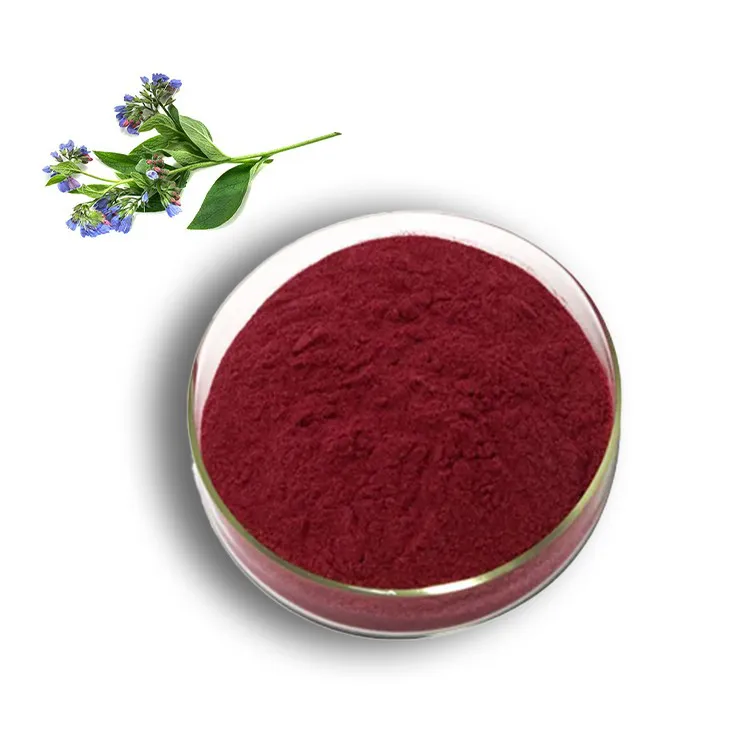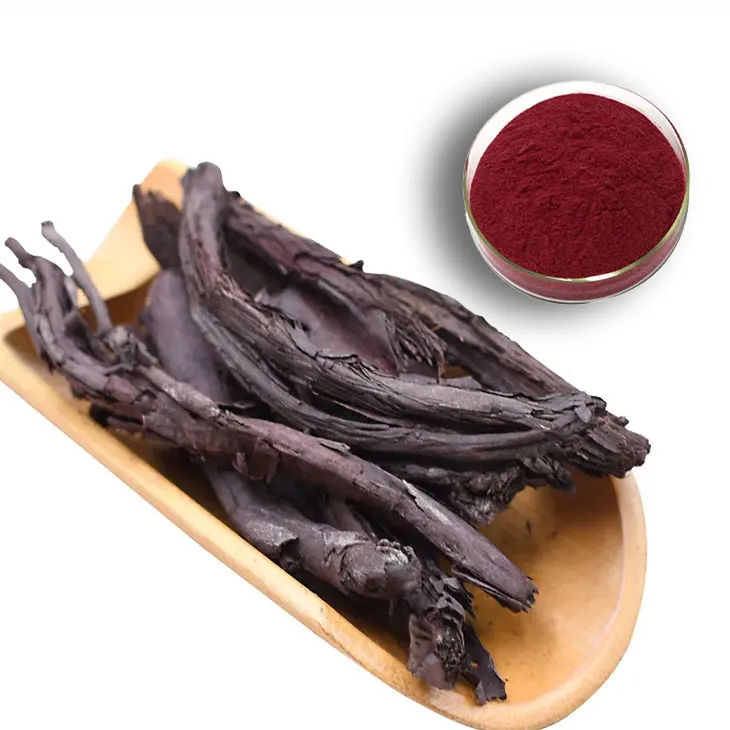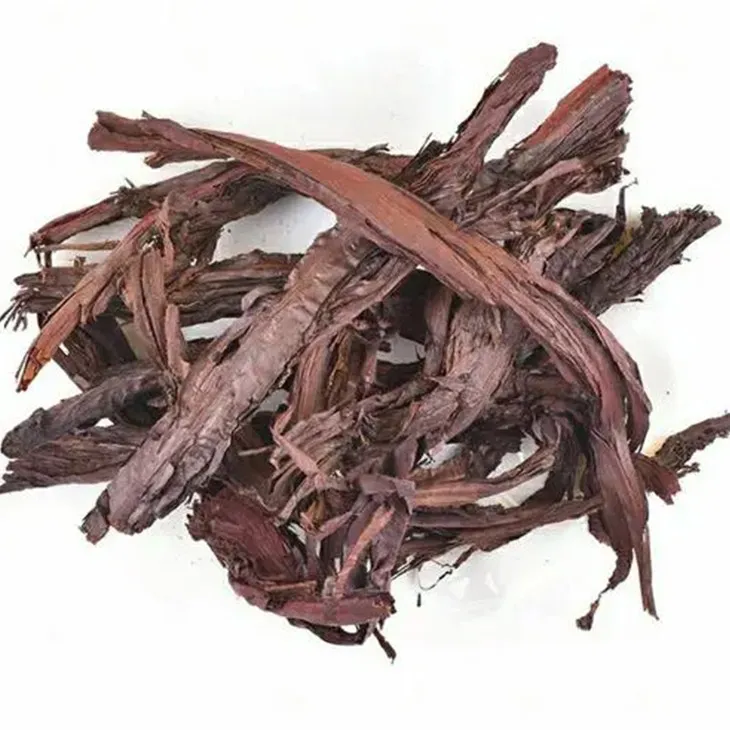- 0086-571-85302990
- sales@greenskybio.com
14 Major Health - care Effects of Shikonin.
2024-11-12

1. Introduction to Shikonin
Shikonin is an important active ingredient that is extracted from Lithospermum erythrorhizon. It has been the focus of extensive research in recent years due to its multiple beneficial health - care effects. This natural compound has shown great potential in various fields related to health and medicine.

2. Anti - inflammatory Effects
Shikonin has significant anti - inflammatory properties. Inflammation is a natural response of the body to injury or infection, but chronic inflammation can lead to various diseases. Shikonin can interfere with the inflammatory signaling pathways in the body. For example, it can inhibit the production of pro - inflammatory cytokines such as interleukin - 1β (IL - 1β) and tumor necrosis factor - α (TNF - α). This helps to reduce the overall inflammatory response in the body. Inflammatory diseases such as arthritis can potentially benefit from shikonin's anti - inflammatory action. In animal studies, shikonin has been shown to reduce joint swelling and pain associated with arthritis models.

3. Antibacterial Effects
One of the remarkable features of shikonin is its antibacterial activity. It can act against a wide range of bacteria. Shikonin has the ability to disrupt the bacterial cell membrane, which is essential for the survival of bacteria. By doing so, it can cause leakage of intracellular components and ultimately lead to bacterial death. For instance, it has been found to be effective against common pathogenic bacteria such as Staphylococcus aureus and Escherichia coli. This antibacterial property makes shikonin a potential candidate for the development of new antibacterial agents, especially in the face of the increasing problem of antibiotic resistance.

4. Antioxidant Effects
Shikonin also exhibits antioxidant capabilities. The body is constantly exposed to oxidative stress, which is caused by the production of reactive oxygen species (ROS). These ROS can damage cells and their components, including DNA, proteins, and lipids. Shikonin can scavenge free radicals, which are highly reactive molecules that contribute to oxidative stress. It can also enhance the activity of antioxidant enzymes in the body, such as superoxide dismutase (SOD) and glutathione peroxidase (GSH - Px). By reducing oxidative stress, shikonin may play a role in preventing various diseases associated with oxidative damage, such as cardiovascular diseases, neurodegenerative diseases, and cancer.
5. Antitumor Effects
The antitumor effects of shikonin are of great interest. It can target cancer cells through multiple mechanisms. Shikonin has been shown to induce apoptosis (programmed cell death) in cancer cells. It can also inhibit the proliferation of cancer cells by interfering with cell cycle progression. For example, it can arrest cancer cells at the G2/M phase of the cell cycle. Moreover, shikonin has the potential to inhibit tumor angiogenesis, which is the process by which tumors develop their own blood supply. By blocking angiogenesis, shikonin can limit the growth and metastasis of tumors. Different types of cancers, including breast cancer, lung cancer, and melanoma, have been studied in relation to shikonin's antitumor effects in pre - clinical research.
6. Regulation of the Immune System
Shikonin can play a role in regulating the immune system. It can modulate the function of immune cells such as lymphocytes, macrophages, and dendritic cells. For example, it can enhance the phagocytic activity of macrophages, which are important for the clearance of pathogens and foreign substances. Shikonin can also regulate the balance between Th1 and Th2 immune responses. A balanced immune response is crucial for maintaining good health and preventing autoimmune diseases. In some autoimmune disease models, shikonin has been shown to correct the abnormal immune response and reduce the symptoms of the disease.
7. Promotion of Wound Healing
Shikonin has the ability to promote wound healing. In the process of wound healing, several steps are involved, including inflammation, cell proliferation, and tissue remodeling. Shikonin can influence these steps positively. It can reduce excessive inflammation at the wound site, which is beneficial for the early stage of wound healing. At the same time, it can stimulate the proliferation of fibroblasts, which are cells responsible for producing collagen, an important component of the extracellular matrix in the wound. Shikonin can also enhance angiogenesis in the wound area, which is necessary for providing oxygen and nutrients to the healing tissue.
8. Protection of the Liver
Shikonin can offer protection to the liver. The liver is a vital organ in the body, and it is often exposed to various toxins and drugs that can cause liver damage. Shikonin can prevent liver injury by reducing oxidative stress in the liver. It can also inhibit the activation of hepatic stellate cells, which are involved in the development of liver fibrosis. In addition, shikonin can enhance the liver's detoxification function by increasing the activity of cytochrome P450 enzymes. This helps the liver to metabolize and eliminate toxins more efficiently.
9. Protection of the Cardiovascular System
Shikonin has beneficial effects on the cardiovascular system. It can help to lower blood pressure. One of the mechanisms is by relaxing blood vessels. Shikonin can also reduce lipid peroxidation in the blood vessels, which is associated with the development of atherosclerosis. By reducing oxidative stress in the cardiovascular system, it can prevent the formation of atherosclerotic plaques. Moreover, shikonin may have a role in preventing platelet aggregation, which is an important factor in thrombosis and heart attacks.
10. Improvement of Digestive Function
Shikonin can improve digestive function. It can enhance the secretion of digestive enzymes in the stomach and intestines. This helps in the better digestion and absorption of food. Shikonin can also regulate the intestinal microbiota. A balanced intestinal microbiota is important for maintaining good digestive health. It can promote the growth of beneficial bacteria and inhibit the growth of harmful bacteria in the intestine. In addition, shikonin may have a role in protecting the intestinal mucosa from damage caused by toxins or inflammation.
11. Anti - diabetic Effects
Shikonin has potential anti - diabetic effects. In diabetes, there are problems with insulin secretion and insulin resistance. Shikonin can improve insulin sensitivity in cells. It can also stimulate pancreatic beta - cells to secrete more insulin. In animal models of diabetes, shikonin has been shown to lower blood glucose levels. This makes it a possible candidate for the development of new drugs for the treatment of diabetes.
12. Anti - allergic Effects
Shikonin has anti - allergic properties. Allergic reactions are mediated by the immune system, specifically by the activation of mast cells and the release of histamine. Shikonin can inhibit the activation of mast cells and the subsequent release of histamine. This can reduce the symptoms of allergic reactions, such as itching, sneezing, and skin rashes. In vitro and in vivo studies have demonstrated shikonin's ability to prevent allergic responses.
13. Neuroprotective Effects
Shikonin has neuroprotective effects. The nervous system is vulnerable to oxidative stress and inflammation. Shikonin can protect neurons from damage caused by these factors. It can cross the blood - brain barrier and reach the brain cells. In neurodegenerative diseases such as Alzheimer's and Parkinson's diseases, shikonin may play a role in preventing the death of neurons and the progression of the diseases. It can also improve cognitive function in animal models of neurodegenerative diseases.
14. Anti - aging Effects
Shikonin may have anti - aging effects. The aging process is associated with increased oxidative stress, inflammation, and cellular damage. As shikonin has antioxidant, anti - inflammatory, and cell - protecting properties, it may be able to slow down the aging process. It can maintain the integrity of cells and tissues, and may also affect the expression of genes related to aging. Although more research is needed in this area, the potential of shikonin in anti - aging is an exciting area of study.
15. Conclusion
Shikonin, with its 14 major health - care effects, is a very promising natural compound. Its diverse functions in anti - inflammation, antibacterial, antioxidant, antitumor, immune regulation, wound healing, and other aspects make it a potential candidate for the development of new drugs and health - care products. However, more research is still needed to fully understand its mechanisms of action and to explore its potential applications in human health. With the increasing demand for natural and effective health - care substances, shikonin is likely to receive more attention in the future.
FAQ:
What are the anti - inflammatory mechanisms of shikonin?
Shikonin exerts its anti - inflammatory effects through multiple pathways. It can inhibit the production of pro - inflammatory cytokines such as interleukin - 1β (IL - 1β), interleukin - 6 (IL - 6), and tumor necrosis factor - α (TNF - α). It also has an impact on the activation of inflammatory cells like macrophages, suppressing their excessive activation and the subsequent release of inflammatory mediators. Additionally, shikonin may interfere with certain signaling pathways related to inflammation, for example, the NF - κB pathway, thereby reducing the inflammatory response.
How does shikonin protect the liver?
Shikonin protects the liver in several ways. It can prevent liver cell damage caused by toxins or oxidative stress. It has antioxidant properties that scavenge free radicals in the liver, reducing oxidative damage to liver cells. Moreover, shikonin may regulate lipid metabolism in the liver, preventing the accumulation of lipids which can lead to fatty liver disease. It also has anti - inflammatory effects in the liver, which helps to reduce inflammation - related liver damage.
What is the role of shikonin in promoting wound healing?
Shikonin promotes wound healing through multiple aspects. It has antibacterial properties, which can prevent wound infection by inhibiting the growth of bacteria. It also stimulates the proliferation and migration of fibroblasts, which are important cells in the wound - healing process as they are involved in the synthesis of extracellular matrix. Additionally, shikonin can enhance angiogenesis at the wound site, providing the necessary blood supply for the healing process.
How does shikonin regulate the immune system?
Shikonin can regulate the immune system in a complex manner. It can modulate the function of immune cells such as T cells and B cells. For example, it may enhance the activity of certain subsets of T cells that play a role in immune defense. It can also affect the cytokine production of immune cells, promoting the production of beneficial cytokines while suppressing the production of excessive pro - inflammatory cytokines. This helps to maintain the balance of the immune system.
What are the antioxidant mechanisms of shikonin?
Shikonin acts as an antioxidant mainly by scavenging free radicals. It has the ability to donate electrons to free radicals, thereby neutralizing them and preventing them from causing oxidative damage to cells and tissues. Shikonin may also upregulate the expression of antioxidant enzymes in the body, such as superoxide dismutase (SOD) and glutathione peroxidase (GPx), which further enhance the antioxidant defense system.
Related literature
- The Antitumor Activity of Shikonin: A Review"
- "Shikonin and Its Immunomodulatory Effects"
- "Antioxidant Properties of Shikonin: Mechanisms and Potential Applications"
- ▶ Hesperidin
- ▶ citrus bioflavonoids
- ▶ plant extract
- ▶ lycopene
- ▶ Diosmin
- ▶ Grape seed extract
- ▶ Sea buckthorn Juice Powder
- ▶ Beetroot powder
- ▶ Hops Extract
- ▶ Artichoke Extract
- ▶ Reishi mushroom extract
- ▶ Astaxanthin
- ▶ Green Tea Extract
- ▶ Curcumin Extract
- ▶ Horse Chestnut Extract
- ▶ Other Problems
- ▶ Boswellia Serrata Extract
- ▶ Resveratrol Extract
- ▶ Marigold Extract
- ▶ Grape Leaf Extract
- ▶ blog3
- ▶ blog4
- ▶ blog5
-
Organic Tongkat Ali extract powder factory.
2024-11-12
-
How to make powder with ashwagandha extract.
2024-11-12
-
Rosehip extract manufacturers from China.
2024-11-12
-
The best cat's claw extract in nature.
2024-11-12
-
Chinese Dandelion Leaf Extract Suppliers.
2024-11-12
-
Lotus leaf extract
2024-11-12
-
Red Vine Extract
2024-11-12
-
Astaxanthin
2024-11-12
-
Aguaje Extract
2024-11-12
-
Reishi mushroom extract
2024-11-12
-
Pine bark Extract Powder
2024-11-12
-
Sea buckthorn Juice Powder
2024-11-12
-
Maitake Mushroom Extract
2024-11-12
-
Fenugreek Extract Powder
2024-11-12
-
Dandelion Root Extract
2024-11-12





















